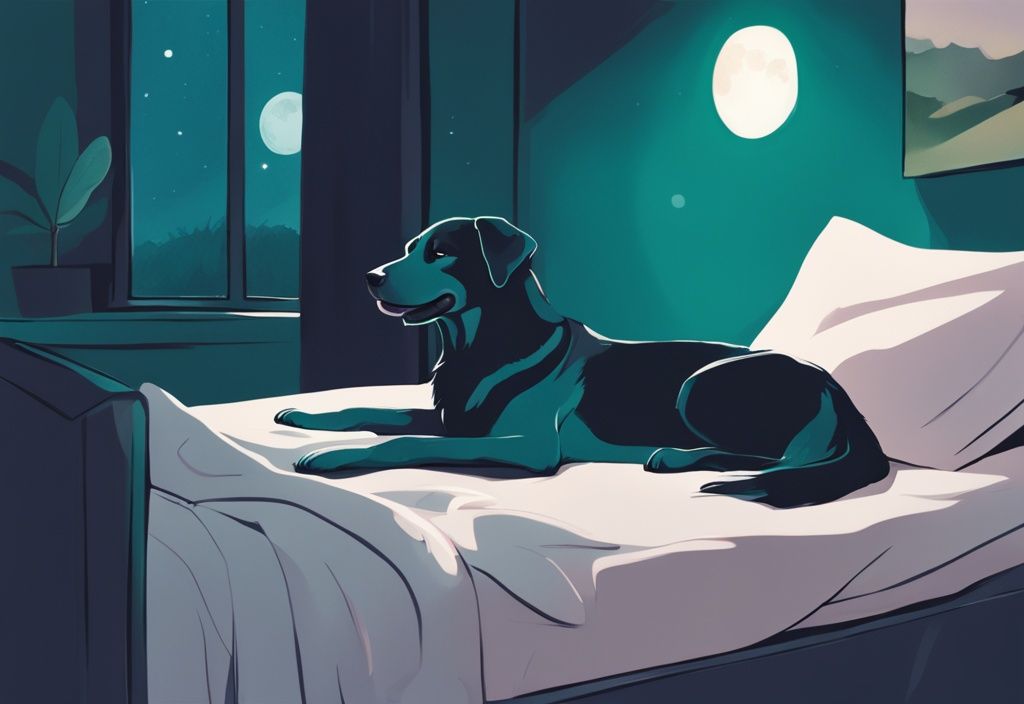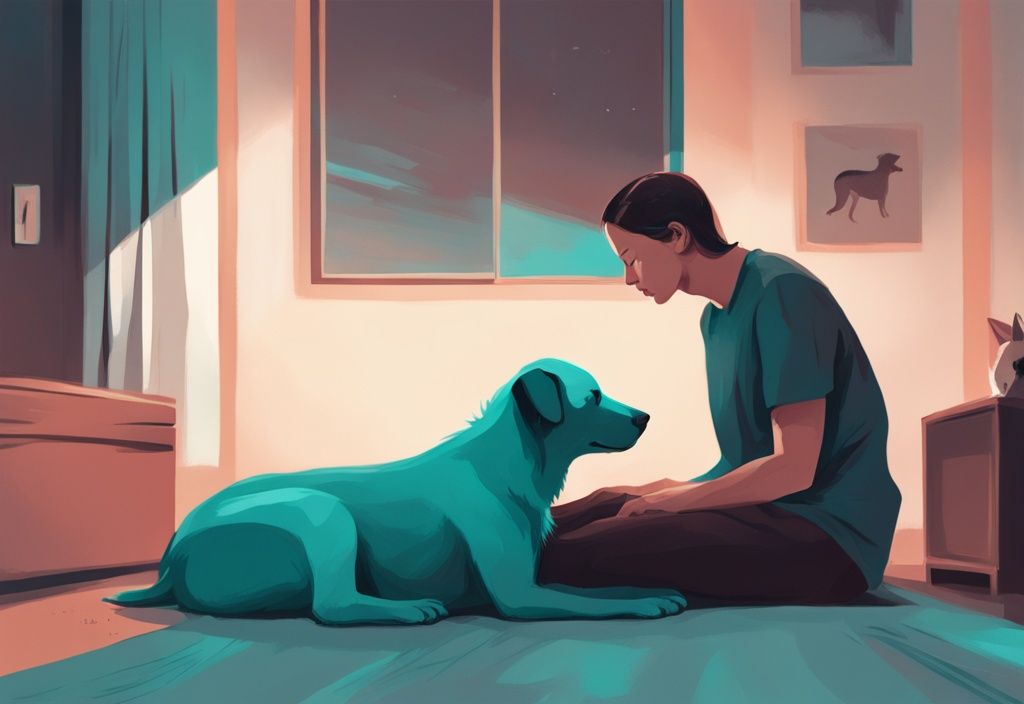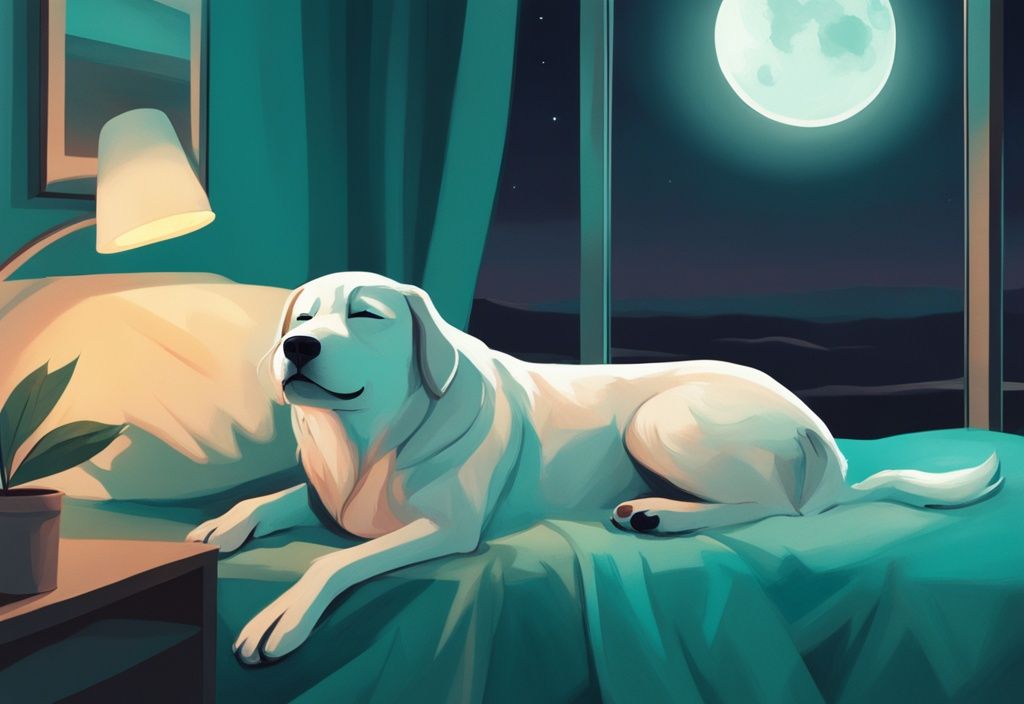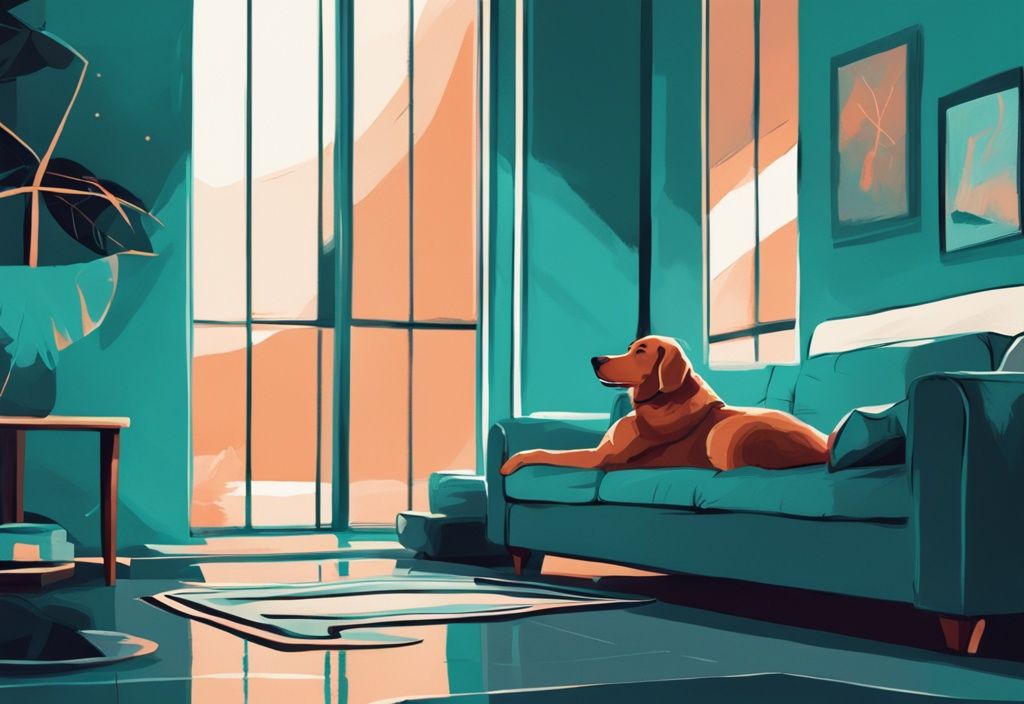“Yip, Yip, Yowl!” Does that sound familiar in the dead of night? If you’ve found yourself wide-eyed, buried under the covers as your fur baby channels his inner wolf, then you’re probably wondering, why is my dog howling in his sleep? As an experienced pet lover and a habitual victim to my own Border Collie, Max’s, melodic moonlight serenades, I can assure you, you’re not alone.
This peculiar behavior can have you tossing and turning, as you ponder if it’s just a dreamy chase with an imaginary rabbit or perhaps something more serious. Luckily, I’ve combed through the hound-dog blues to bring you a comprehensive guide to get to the bottom of what’s triggering these twilight howls.
Dig in, muzzle up, and let’s unravel this together! From decoding their dream-time dramas to understanding when it’s time for some professional help, your journey towards peaceful, howl-free nights begins here.
Reasons Your Dog Might be Howling While Sleeping
Dog Dreams and How They Might Cause Howling
Dogs, just like us, dream during their REM (Rapid Eye Movement) sleep. Imagine their little brains buzzing with activity! During this stage, most of their muscles go limp, a phenomenon called muscle atonia. Interestingly, pets can’t report their dreams, but scientists have some evidence about what is happening when Sparky and Mittens sleep, suggesting that cats and dogs likely experience dreams in a similar way as humans. You can read more about this fascinating topic [here](https://www.scientificamerican.com/article/what-do-dogs-and-cats-dream-about/). But this doesn’t entirely still them or keep them from making noises.
You might catch your pup howling in his sleep, which can be a direct portrayal of his dream adventures. Picture him chasing squirrels or running with the pack—these dream scenarios can definitely prompt some mid-slumber howling. It’s similar to how we might mumble or sigh while we dream.
Possible Nightmares
Bet you didn’t know your furry friend could have nightmares too! Though we can’t be sure what they dream about, dogs might relive stressful moments in their sleep, leading to some spooky nocturnal howls. They could be reacting to perceived threats or feeling anxious or alone in their dreams.
This howling is just their way of expressing the same fear and anxiety they’d show if they were awake. Who knew nap time could be so dramatic?
Feeling Alone or Anxiety-Triggered Howling in Sleep
Ever wondered why is my dog howling in his sleep? Loneliness or anxiety from separation might be to blame. Dogs are super social animals; feelings of isolation can seep into their sleep, causing them to howl for companionship.
If your dog’s had a particularly stressful day, these anxious vibes can carry over into dreamland, leading to more restless nights filled with howls. For pet owners wondering, where you can declaw my cat for free, it’s important to consider the ethical implications and alternatives. This kind of nocturnal vocalization often mirrors their daytime emotions and routines. A little extra cuddle time during the day might help keep those scary dreams at bay!
When Should You Be Concerned About Your Dog’s Sleep Howling?
Hey there, dog lovers! Let’s dive into the important signs and causes of sleep howling in dogs.
Signs of Distress or Discomfort to Watch Out For
Constant or excessive howling during sleep can be a clear indicator that your furry friend is feeling distressed or uncomfortable. Keep an eye out for unusual behavior like restless movements or signs of physical discomfort. Are they acting lethargic, losing their appetite, or showing noticeable changes in behavior? If you’re wondering, “why does my dog lick the couch,” it could be related to these behavioral changes. Learn more about potential reasons for this behavior and how to address it effectively. If these signs persist, it’s time to dig deeper and figure out what’s causing the fuss.

Underlying Medical Issues That May Cause Sleep Howling
Epilepsy
Epilepsy is a condition that might just muddy the waters when it comes to interpreting your dog’s howling.
Imagine unexpected vocalizations during sleep, including howling, which can easily be mistaken for regular dream-induced noises. That’s seizure activity sneaking in, so recognizing the difference is crucial.
Chronic Pain
Poor pups dealing with chronic pain, like arthritis, often have a tough time during sleep. It’s like their muscles and joints decide to stage a protest right when they need rest. This discomfort can lead to vocal signs like howling or whimpering, making their dreams sound a bit too dramatic.
Canine Cognitive Decline
As our dogs age (Max included!), they can experience cognitive dysfunction syndrome, much like Alzheimer’s in humans. This not-so-fun syndrome can mess with their sleep patterns and behaviors, leading to more howling. It’s like they’re confused or disoriented, and out come the vocalizations, right from dreamland.
The Importance of Consulting a Veterinarian
If your dog’s sleep howling is becoming a frequent orchestra of distress or comes with other concerning symptoms, it’s time to see the vet. A veterinarian can perform physical exams and neurological tests to pinpoint any underlying health issues. Your observations of your dog’s sleep behavior (think canine detective work!) will be incredibly valuable in this diagnostic journey, helping the vet provide the best treatment.
How Can You Mitigate Your Dog’s Excessive Sleep Howling?
Are you pondering, “Why is my dog howling in his sleep?” This section will guide you through some practical steps to address this nocturnal serenade.
Ensuring Your Dog Gets Sufficient Exercise and Mental Stimulation
Providing your dog with regular physical activity is essential for reducing stress and anxiety, which are often culprits of sleep disturbances. A well-exercised dog will naturally experience more restful sleep, reducing the chances of howling.
Incorporate activities such as:
- Daily walks
- Play sessions
- Agility training

These activities will tire out your dog physically. Equally important is mental stimulation. Use interactive toys, puzzle feeders, and training exercises to keep your dog’s mind busy. Not only does this alleviate boredom, but it also helps manage anxiety, thus potentially minimizing sleep howling. Remember, a tired dog is a happy dog, and this extends to their sleep patterns as well.
Creating a Comfortable Sleep Environment for Your Dog
A cozy and secure sleeping environment can make a significant difference in your dog’s sleep quality. Ensure your dog has a comfy bed in a quiet, dark room to facilitate uninterrupted sleep. White noise machines or calming music can help drown out any disruptive background noises.
Make sure the sleeping area is:
- Free from disturbances
- Provides a sense of security
Establish a designated sleeping spot where your dog feels at home. This consistency helps build a routine, making them feel more at ease and possibly reducing instances of howling during sleep.
Why You Should Never Punish Your Dog for Sleep Howling
Punishing your dog for howling in its sleep can actually exacerbate the issue. Increased anxiety and stress are likely outcomes of such reprimands. Remember, dogs aren’t in control of their actions while asleep.
Approach the situation with understanding and compassion. Focus on identifying and addressing any underlying issues. Your dog’s howling could be a symptom of stress, fear, or anxiety. Positive reinforcement and creating a calming environment are better solutions than punishment.
Establishing a Bedtime Routine
A consistent bedtime routine can significantly improve your dog’s sleep quality. Consistent routines help dogs feel secure and relaxed. Include calming activities such as:
- Gentle play
- Brushing
- Quiet time
These pre-sleep activities can have a soothing effect, making it easier for your dog to transition into sleep without distress. A well-established bedtime routine not only improves sleep quality but can also reduce the likelihood of your dog howling in its sleep.
Top Questions Dog Owners Have About Sleep Howling
Ever wondered why your furry friend belts out a tune in the middle of the night? Let’s dive into why your dog might be howling in his sleep and what, if anything, you might need to do about it.

Is It Normal for Dogs to Howl in Their Sleep?
Absolutely, it’s perfectly normal! Just like some of us chat away in our dreams, dogs can howl when they’re deep in dreamland. This occasional howling usually mirrors their dream state and rarely signals any trouble. Imagine your pup dreaming of a thrilling chase or an adventurous romp—who wouldn’t howl with joy?
What Should I Do if My Dog Howls Excessively in His Sleep?
If howling turns into a nightly concert, it’s time to play detective. Start by keeping a diary of when and how often your dog howls, along with any other curious behaviors. A well-exercised and mentally stimulated dog is often a quieter sleeper. Ensure his bed is as comfy as Max’s favorite cushy corner. If howling escalates or new symptoms pop up, a vet visit might be in order. It’s always good to rule out any hidden health hiccups.
Should I Be Worried if My Older Dog Howls in His Sleep?
As our furry friends age, they might become more vocal in their sleep—think of it as canine midnight musings. However, increased howling in senior dogs might be due to cognitive dysfunction syndrome or chronic pain. A check-in with your vet can help pinpoint if any age-related conditions are making your pooch howl away the night.
Are Certain Breeds More Prone to Sleep Howling?
Oh, definitely! Just like Max, my Border Collie, who has a knack for vocal storytelling, some breeds are naturally more inclined to howl. Sled dog breeds, like Huskies, or high-energy breeds might be more vocal, both when awake and when they’re off in dreamland. So, if your dog’s lineage includes any of these chatterboxes, their nocturnal howling might just come with the territory!
How Do I Know if My Dog’s Howling Is Due to a Medical Issue?
If the howling seems intense or distressing, and you notice signs like lethargy, changes in appetite, or unusual behavior, it could be a red flag. It’s wise to schedule a vet check-up. Providing a detailed description of your dog’s howling bouts and any other odd behaviors can help your vet diagnose any potential issues more effectively. After all, better safe than sorry when it comes to our beloved pets!
Conclusion
In conclusion, understanding why is my dog howling in his sleep requires a nuanced approach. While it’s generally a reflection of your dog’s dream state and not necessarily a cause for concern, excessive or distressing howling might indicate an underlying issue. REM sleep, where most dreaming occurs, can cause dogs to vocalize just as humans might talk or moan in their sleep. However, persistent sleep howling could be a symptom of more significant problems such as nightmares, anxiety, or even medical conditions like epilepsy or chronic pain.
Monitoring your dog’s behavior thoroughly is crucial. Keep an eye out for any additional symptoms such as unusual daytime anxiety, loss of appetite, lethargy, or any other behavioral changes. These observations can provide valuable insights for your veterinarian to diagnose any underlying issues.
Creating a comfortable sleep environment for your dog is essential to mitigate sleep howling. Ensure their bed is cozy and located in a quiet, dark room free from disturbances. Incorporating white noise or calming music can also help create a peaceful environment conducive to restful sleep. Establishing a regular bedtime routine with calming activities can make your dog feel secure and reduce anxiety, potentially decreasing sleep howling.
In summary, while sleep howling can be a natural part of a dog’s dreaming cycle, monitoring your pet’s overall health and behavior is vital. Any signs of excessive howling or distress should prompt a consultation with a veterinarian. Providing a safe and comfortable sleep environment along with a consistent bedtime routine can significantly enhance your dog’s well-being and reduce sleep-related issues.
Lily Thompson
